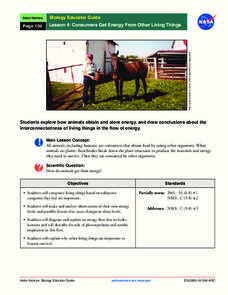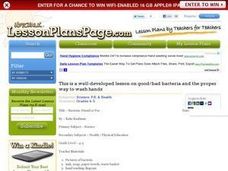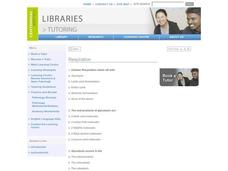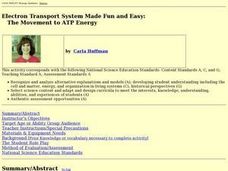Curated OER
Aerobic And Anaerobic Activity
Third graders engage in the study of aerobic and anaerobic activities. They discuss the differences in the type of exercises involved. Students identify the types of activities they enjoy based upon the information given. Then students...
Curated OER
Alcoholic Fermentation in Yeast
Biology classes will bubble with excitement as they complete this assignment. Beginning with an informative overview of cellular respiration and fermentation processes, the highlight comes as an experiment in determining the rate of...
Curated OER
Energy, Matter, and Organization
Tenth graders review the Energy, Matter, and Organization unit. They have one week to complete an essay. Students must submit a concept map or drawing. The activity is introduces by reading a short story line which presents a simple...
Curated OER
Aerobic vs. Anaerobic Respiration
Students define aerobic and anaerobic respiration. They compare and contrast the processes of aerobic and anaerobic respiration. Students identify organisms that use the processes of aerobic and anaerobic to synthesize energy from food.
Curated OER
Aerobic and Anaerobic Conditioning
Students view the A.D.A.M. computer simulation of aerobic and anaerobic exercise. They break into groups and members brainstorm and list as many aerobic and anaerobic exercises as possible in five minutes.
Curated OER
Got Gas? How Much?
Young scholars perform an experiment that measures respiration. For this performing an experiment that measures respiration lesson, students discuss aerobic and anaerobic respiration. Young scholars measure the gas produced...
NASA
Consumers Get Energy From Other Living Things
How do plants and animals get their food? Learn about where energy comes from, how animals store energy, and aerobic respiration, in a activity that allows scholars to diagram energy flows.
Curated OER
Bacteria: Friend or Foe?
Students examine a variety of environmental and industrial roles of bacteria. explore where bacteria can be found and distinguish bacteria from other organisms.
Teacher Web
Archaebacteria and Eubacteria
Take young biologists back to the beginning of life on Earth with this presentation on bacteria. Examining the different classifications of bacteria, this presentation introduces young scientists to the concepts of autotrophs and...
Curated OER
Respiration
This series opens with diagrams of experimental setups. A data table is displayed and questions are asked, indicating that the intent is for lab groups to perform the depicted experiments. At slide twelve, a coherent lesson about the...
Curated OER
Respiration
For this cellular respiration worksheet, students answer 14 multiple choice questions related to aerobic and anaerobic respiration.
Curated OER
De"compost"ition
High schoolers develop an understanding of the decomposition process and the parameters which influence the rate at which it occurs.
Curated OER
Water Fitness
High schoolers participate in a series of aerobic exercises in water to help improve fitness.
Curated OER
Using Magnetotactic Bacteria to Study Natural Selection
Young scholars observe bacteria that are able to orient themselves using the Earth's magnetic field.They comprehend the difference between anaerobic and aerobic organisms. Students can tell the difference of the shape of magnetic force...
Curated OER
Aerobic Sock Darts
Students, in groups, have 2 hoops set up about 8-10 feet apart and across from each other. Each group tries to get as many darts to land inside the hoops as possible in the time limit.
Curated OER
Electron Transport System Made Fun and Easy:
Learners identity the components of electron transport system through role play. They explain the role of intermediate energy carriers to the production of ATP molecules. They describe the relationship of electron transport system to...
American Physiological Society
An Inquiry into Alcoholic Fermentation
Introduce life science students to their new "best buds" yeast! Using a wide variety of materials, lab groups design an experiment that illustrates how yeast acquires the resources it needs to undergo cellular respiration. The teacher's...
Curated OER
Cellular Respiration: Harvesting Chemical Energy
A complete overview of oxidation, reduction, and how electrons are moved in respiration. You could use this slide show to elaborate on the concept of harvesting stored energy, and to summarize the stages of aerobic and anaerobic metabolism.
Open Colleges
Your Brain Map: Strategies for Accelerated Learning
The brain is a complex organ with many different structures and functions. An interactive diagram allows learners to explore the different structures while pop-ups describe their functions. Secondary interactives show the structures of...
Curated OER
Cellular Respiration stage 1: Glycolysis
Ten reactions involved with the process of glycolysis within cellular respiration are summarized here. The aerobic stages and anaerobic interactions leading to fermentation are detailed and wonderful diagrams to support the information...
NASA
The Cycle of Matter
An educational instructional activity focuses on the idea of conservation of matter through a demonstration of the water cycle, a discussion of digesting food, and the path of carbon and oxygen atoms as they change form.
Curated OER
Describe Environmental Interrelationships
Students describe environmental interrelationships using list of criteria. They are able to explain organism interaction, based on definitions provided. Also, students can use references and worksheets, to describe effects of pollution...
Curated OER
Animal Survival - Water and Waste
Here is a very simple set of slides to complement your lecture about the importance of water for animals. It includes a table of where we gain liquid from, the chemical reaction for aerobic respiration, how we lose water, and how ADH and...
Serendip
How Do Muscles Get the Energy They Need for Athletic Activity?
Every muscle movement requires energy, but where does that energy come from? Scholars answer this question and more as they complete a worksheet. By following the directions, completing research, and discussing it as a class, they begin...

























